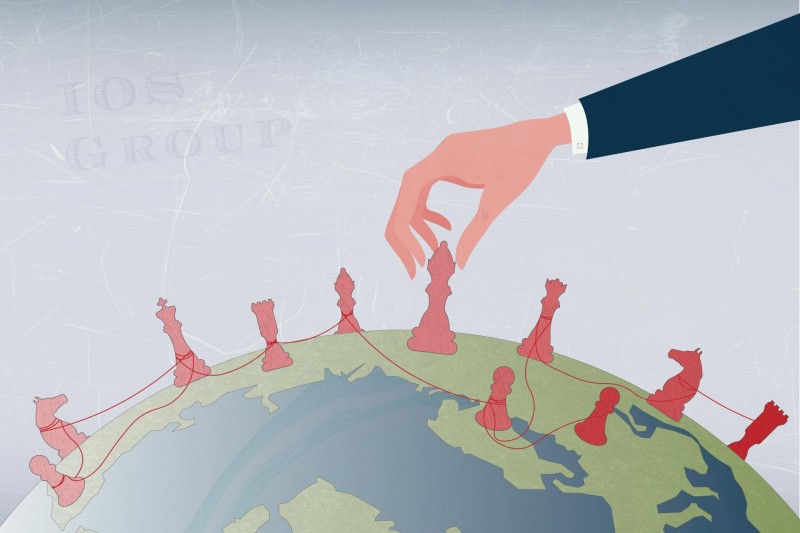For almost 30 years, IOS Group created shell companies for international clients, playing a major, though apparently passive, behind-the-scenes role in multiple high-profile money laundering cases.
The Irish-Latvian company steadily pumped out the paperwork for shadow businesses that appear to exist only to hide assets and shield owners from global regulators. That infrastructure enabled a litany of suspect financial operations, such as pyramid schemes and a US$2.9 billion slush fund used by Azerbaijan’s elites.
Now records obtained by OCCRP and the Lithuanian news site 15min.lt show that IOS Group’s shell company business also laid the administrative foundation for the Troika Laundromat, a massive financial scheme set up and controlled by Troika Dialog, once Russia’s largest private investment bank.
The Laundromat shuffled billions of dollars through offshore companies on behalf of Troika’s clients, many of whom were members of Russia’s elite. The system enabled people to channel money out of Russia, sidestep regulations in place at the time, hide assets abroad, and launder money. It also supplied cash to Russian President Vladimir Putin’s friends and powerful oligarchs, and enabled criminals to mask the illicit origins of their cash.
There is no evidence IOS Group understood the intentions of its clients or knowingly participated in any criminal activity. However, the company was the registration agent of choice for dozens of crooks behind major global scandals. It set up at least 35 of the Laundromat’s estimated 75 offshore companies, providing each with shareholders and directors who were nothing more than proxies to mask the identities of the true owners.
IOS Group appears to have complied with local laws in the countries where it registered companies, many of which don’t demand much documentation on new businesses or require them to have a physical presence.
Jason Sharman, a professor of international relations at Cambridge University who studies shell companies, said they offer great cover for illicit activities.
“Shell companies are so useful in money laundering schemes because they serve as an artificial, expendable legal person that screens and conceals the real criminals in control,’’ he said. “If illicit money or other assets can only be traced back to the shell company, but not the real individuals in control of the shell company, the investigation stops dead.”
Companies created by IOS Group have featured in a number of high-level scandals involving tens of billions of dollars in illicit financial activities.
IOS-LINKED COMPANIES PROMINENT IN PREVIOUS SCANDALS
The methods IOS Group used to register and in some cases maintain offshore companies are typical of financial crime and money laundering schemes, said Ben Cowdock, senior research officer at Transparency International U.K.
“U.K. shell companies sharing the same corporate partners — originally formed by IOS Group — have appeared frequently in alleged economic crime,’’ Cowdock said. “Our research has identified at least 92 U.K. [Limited Liability Partnerships] controlled by IOS shell companies that have been named in corruption and money laundering cases.”
Attempts to reach IOS Group through its offices in Ireland and Latvia were unsuccessful. The company’s website listed contact numbers for offices in Riga, Latvia; Kyiv; and Moscow. The last two are also helplines for depositors of the now-defunct Latvian bank ABLV, once the country’s largest offshore lender. ABLV itself is now liquidating after the U.S. Justice Department described “institutionalized money laundering as a pillar of the bank’s business practices.”
Phone calls to the Kyiv branch of IOS Group went unanswered.
Shortly after receiving OCCRP queries, IOS Group posted on its website that it had ceased operations in 2017, saying it had become impossible for “independent legal offices to continue to work under the same IOS franchise.”
Though many companies created by IOS Group have played a role in illegal activities, the formation agent itself has rarely been penalized.

Shell Company Factory
IOS Group was founded in Dublin as IOS Financial Services in 1992. The Soviet Union had just collapsed, and businesses around the world were pursuing opportunities in the newly opened markets.
In the ensuing years, IOS Group incorporated thousands of shell firms in the U.K. and British Virgin Islands alone. Others were registered in Panama, the United States, Hong Kong, Cyprus, and elsewhere.
Its menu of services included registration and fee facilitation, legal services, annual payments for certificates of good standing, and composition of financial statements. In some cases, clients were billed for "ready-made" companies with "full sets" of documentation prepared by IOS Group for use as needed.
Such shell companies, when combined with offshore banking, allow customers to secretly move money out of their home countries and into the international financial system while hiding its origins. They catered to non-residents and were able to process transactions in U.S. dollars.
The IOS Group-created shell companies often kept accounts in the banks of former Soviet Baltic republics. These shell firms became an essential line of business for the banks, and their offshore financial institutions were favorites of Russian criminals.
In 2017, the year before Latvia passed a law banning shell companies from doing business with its lenders, at least 26,000 of them maintained accounts in the country, processing almost $270 billion annually.
Money laundering crackdowns have led to some closures. Latvia shut down Krajbanka in 2011, while Lithuania closed Snoras bank that year and Ukio Bankas in 2013. All were put out of business after alleged fraud.
The European Central Bank shuttered Latvia’s Trasta Komercbanka in 2016; Estonia closed Versobank in 2018 and will close its scandal-wracked branch of Danske Bank by the end of 2019. In February 2018 the U.S. forced ABLV to begin liquidating. That move prompted Latvia’s parliament to ban the country’s banks from opening accounts for shell companies, though the impact on money laundering in the Baltic states is unclear.
Still, Mark Galeotti, a senior associate fellow at the Royal United Services Institute for Defence and Security Studies in London, says the problem is far from solved.
“While the Latvians may have been the worst offenders, the Baltic banking sector as a whole … remains susceptible to money laundering, in part precisely because of their use for various forms of ‘financial logistics,’ not all of which are questionable transactions, but which do provide a cover for them,” Galeotti said.





